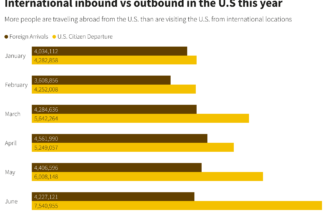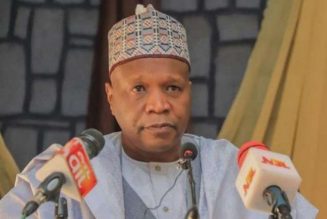
The N.A.A.C.P. urged people to consider Florida’s policies on diversity and race under Gov. Ron DeSantis when thinking of traveling there.
The National Association for the Advancement of Colored People on Saturday issued a travel advisory for Florida, saying that under Gov. Ron DeSantis the state has become “openly hostile toward African Americans, people of color and L.G.B.T.Q.+ individuals.”
The N.A.A.C.P. joins the League of United Latin American Citizens, a civil rights organization that issued a Florida travel warning on Wednesday, and Equality Florida, a gay rights advocacy group that issued one last month.
The N.A.A.C.P.’s travel advisory does not explicitly recommend against travel to Florida. But it urges travelers to be aware of the state’s politics, and the organization said that “the governor and the state of Florida have shown that African Americans are not welcome in the state of Florida.”
The N.A.A.C.P. said in a statement on Saturday that the travel advisory was in “direct response to Gov. Ron DeSantis’s aggressive attempts to erase Black history and to restrict diversity, equity and inclusion programs in Florida schools.”
The advisory comes after Mr. DeSantis last week signed legislation defunding diversity programs at the state’s public universities and colleges. The advisory also cited concerns with a number of other laws recently passed in Florida regarding voting rights and concealed carry of guns.
Mr. DeSantis’s office did not respond to a request for comment on Sunday.
After signing the legislation last week on diversity, equity and inclusion programs, Mr. DeSantis said that the law would ensure “Florida’s institutions encourage diversity of thought, civil discourse and the pursuit of truth for generations to come.” Mr. DeSantis has often spoken out about what he describes as “woke indoctrination” and leftist agendas in schools.
It is not clear how much influence the statements will have on travel to Florida. But they demonstrated, along with his escalating disputes with Disney, how Mr. DeSantis’s reliance on conservative culture war issues as he gears up for what is expected to be a presidential run was colliding with the state’s signature industry.
Disney on Thursday announced it was backing off a plan to build an office complex in Orlando that would have cost about $1 billion and brought thousands of jobs to the state.
Derrick Johnson, the president and chief executive of the N.A.A.C.P., said in a statement on Saturday that under Mr. DeSantis’s leadership, Florida had “become hostile to Black Americans and in direct conflict with the democratic ideals that our union was founded upon.”
“Let me be clear,” Mr. Johnson said, “failing to teach an accurate representation of the horrors and inequalities that Black Americans have faced and continue to face is a disservice to students and a dereliction of duty to all.”
Dana Young, president and chief executive of Visit Florida, the state’s tourism marketing corporation, called the travel advisories a “political stunt” most likely to hurt people in Florida who depend on tourism to support themselves and their families.
“It is disappointing when partisan organizations attempt to weaponize travel in pursuit of political ends,” she said.
While the N.A.A.C.P.’s travel advisory follows the new legislation restricting diversity, equity and inclusion programs in Florida schools, the travel advisory from the League of United Latin American Citizens, or L.U.L.A.C., cited concerns about legislation signed by Mr. DeSantis earlier this month that focused on undocumented immigrants.
The legislation will require private employers in Florida with 25 or more workers to confirm an employee’s eligibility to work in the United States. It will also invalidate ID cards issued to undocumented immigrants in other states, such as New York, and it will require Florida hospitals that accept Medicaid to ask patients whether they are U.S. citizens or whether they are “lawfully present” in the country.
David Cruz, a L.U.L.A.C. spokesman, said on Sunday that depending on an individual’s immigration status, the organization’s travel advisory was either a warning not to travel to Florida or an advisory to be cautious while traveling there.
Domingo Garcia, the national president of L.U.L.A.C., said at a news conference on Wednesday that Florida was using “immigrants as political piñatas for the purposes of basically just getting votes.”
In addition to issuing a travel advisory, Mr. Garcia said that L.U.L.A.C. was considering filing a lawsuit in federal court against the state of Florida when the legislation goes into effect in July. Mr. Cruz said the organization was also planning protests “in key Florida cities with significant Latino essential worker populations.”
Equality Florida issued its travel advisory last month, citing concern with a number of laws in Florida, including last year’s passage of legislation that prohibits classroom instruction and discussion about sexual orientation and gender identity in some elementary school grades, a law that is often referred to by opponents as the “Don’t Say Gay” bill.
Nadine Smith, the executive director of Equality Florida, said in a statement last month that her organization had to respond with a travel advisory “as the laws strip away basic rights and freedoms.”
L.U.L.A.C. officials pointed to the economic impact suffered by Arizona after the state passed legislation in 2010 that was viewed as the nation’s toughest effort to crack down on illegal immigration and criticized as encouraging racial profiling. A study at the time found that Arizona lost about $141 million alone in conference business after the state passed its legislation.
Lydia Guzmán, the chair of L.U.L.A.C.’s national immigration committee and state director for the organization in Arizona, said the state took a serious economic hit as a result of adverse reaction to the legislation.
“I see that happening also in Florida,” Ms. Guzmán said.









